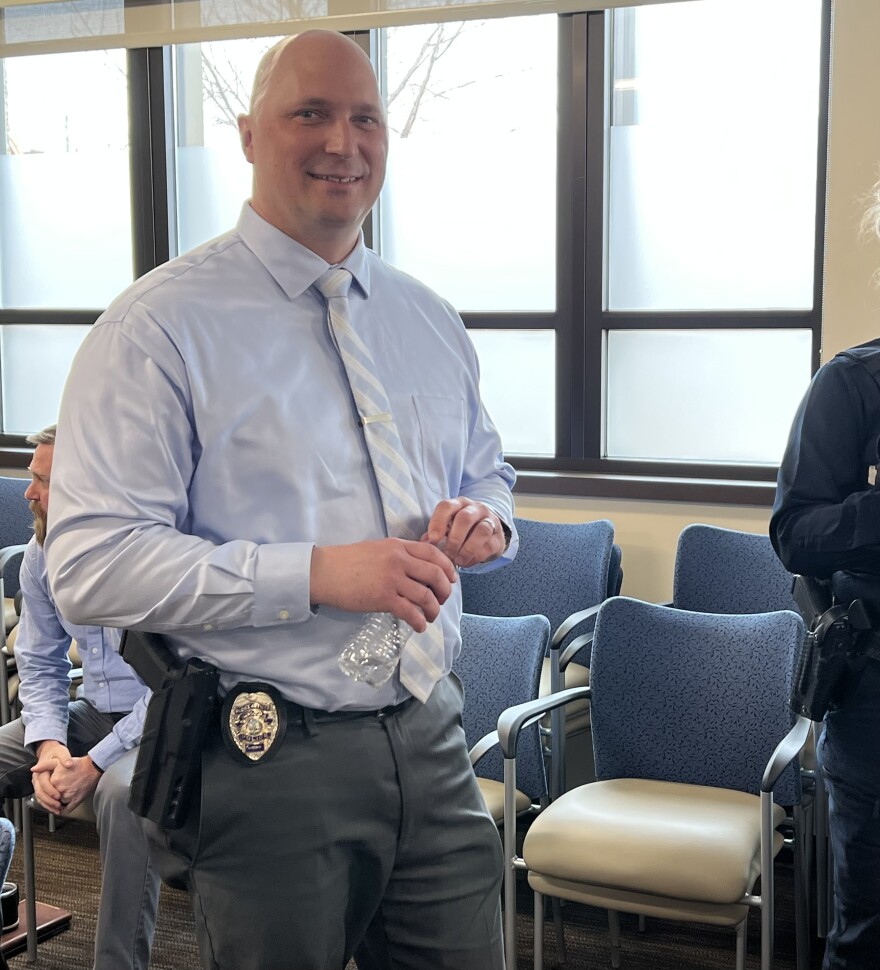Danielle was 17 years old when she met the man who would routinely batter her during their lengthy on-again, off-again relationship. Now 31, Danielle, who requested her last name be withheld to protect her safety and privacy, says even insignificant disagreements could trigger his explosive, violent outbursts. Drinking made it worse.
“He punched me in the face and broke my nose when I was 18. That’s kind of when it started," Danielle says.
He also frequently strangled her, she says.
Despite the violence, she says she loved him and never cooperated with police when concerned neighbors called 9-1-1. That changed after one particularly vicious strangling.
“He was so angry," she remembers. "I couldn’t breathe and I started seeing stars.
"Yeah, at that point I knew, like, it would just get worse.”
Danielle says two thoughts crossed her mind as her partner tightened his grip: She was about to die, and her young child would grow up without a mom.
Someone in the house eventually stepped in to stop the attack. This time when the cops knocked on her door, she ran outside for their help.
“I was shaking. I couldn’t really think," she says. "And then I just told them that he was inside and they went and got him. It took a lot for me to do that, but I’m so glad that I finally did.”
Find domestic violence resources
According to data from Missoula County, local strangulation cases have steadily grown since 2019. The county attorney's office last year charged 47 cases involving strangulation. That’s 50% more than in 2019.
Montana Board of Crime Control statistics show reported strangulation cases in the state grew by about 25% during that same time period.
As domestic violence has increased in frequency and severity in recent years, Missoula County has adopted a first-of-its-kind policy in Montana to respond to assaults and to aid victims.
"Most domestic violence begins with a kick, a push, a shove, a slap, emotional isolation, power and control, financial control; And it escalates to, ultimately, strangulation. And what’s the next step beyond strangulation? It's an actual completed homicide.”Cat Otway, forensic nurse at Missoula’s First Step Resource Center
Cat Otway is a forensic nurse at Missoula’s First Step Resource Center, which provides services and referrals for survivors of abuse and assault. She led much of the work updating Missoula’s strangulation policy to reflect the seriousness of the crime.
"Most domestic violence begins with a kick, a push, a shove, a slap, emotional isolation, power and control, financial control," Otway says. "And it escalates to, ultimately, strangulation.
"And what’s the next step beyond strangulation? It's an actual completed homicide."
Strangulation is identified as one of the most lethal forms of domestic violence.
"Believe it or not, the jugular vein, which is not very deep in the neck, only requires four pounds of pressure for 10 seconds and your victim’s unconscious," says Otway.
To put that in perspective, she says, “to open a Coke can, that takes 20 pounds of pressure."
Otway says studies show men overwhelmingly strangle women to control, dominate and terrorize them. When that happens, “She is 750 percent more likely to die at the hands of that offender in the future.”
That figure jumps to 1,100% if the abuser has access to firearms.
Otway says recently strangled survivors exhibit symptoms that can be easily overlooked or dismissed by untrained eyes. Those include combative behavior; an inability to tell a clear, linear story; dizziness; breathing difficulties and even a loss of bladder or bowel control.

Strangulation of a partner or family member has been a felony in Montana since 2017. Crime victim advocates heralded the law as an overdue, but welcome change.
Missoula County’s new protocol, put in place in mid-April, changes the way first responders and law enforcement respond to strangulation and prioritize the cases for prosecution.
“Our goal in this is really to put these cases on a silver platter to increase prosecution, to hold these offenders accountable, empowering those survivors and getting them medical attention," says Missoula Police Department Detective Nate Griesse.
Under Missoula’s policy, strangulation is now treated as a potentially life-threatening condition regardless of whether injuries are apparent. Survivors are encouraged to quickly seek a medical evaluation to diagnose possible life-threatening effects of strangulation like blood clots.
We started training all medical partnerships — fire, dispatch, our ambulance services, the county attorney's office — all are getting training in identifying strangulations, understanding why that survivor acts the way they do, being trauma informed."Missoula Police Department Detective Nate Griesse
“We started training all medical partnerships — fire, dispatch, our ambulance services, the county attorney's office — all are getting training in identifying strangulations, understanding why that survivor acts the way they do, being trauma informed,” Griesse says.
Early results are encouraging. Griesse says first responders recently convinced a strangulation survivor to seek a medical evaluation. He says doctors detected a blood clot in her neck.
The county is considering a policy to pay for medical expenses for survivors.
Danielle, who herself once suffered at the hands of an abuser, supports Missoula’s protocol, saying it will both raise awareness and save lives.
She says it’s not easy to leave an abusive relationship. But once that difficult decision is made, she points out a lot of people are ready and willing to help. Your life will turn around, she says. Things will get better.
"Once you’re out of it, it’s just a huge relief because you're not afraid every day."
Copyright 2022 Montana Public Radio



